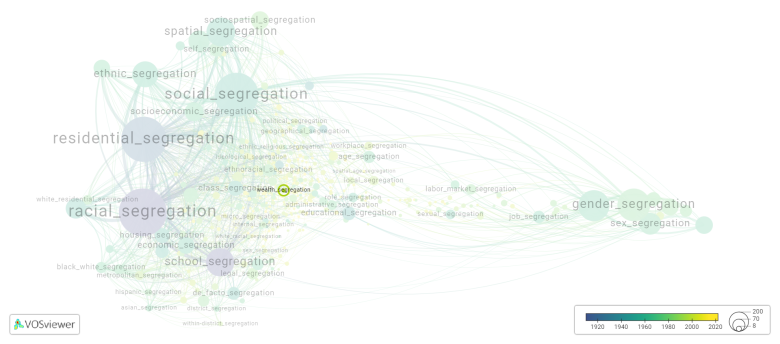Wealth segregation: Difference between revisions
(Creating page) |
(Creating page) |
||
| (5 intermediate revisions by the same user not shown) | |||
| Line 17: | Line 17: | ||
Wealth segregation is frequently discussed in the literature with the following segregation forms: | Wealth segregation is frequently discussed in the literature with the following segregation forms: | ||
[[residential segregation]], [[poverty segregation]] | |||
[[File:wealth_segregation.png|780x780px]] | [[File:wealth_segregation.png|780x780px]] | ||
For the complete network of | |||
This visualization is based on the study [[Segregation_Wiki:About| The Multidisciplinary Landscape of Segregation Research]]. | |||
year of publication https://tinyurl.com/ | |||
For the complete network of interrelated segregation forms, please refer to: | |||
* [https://tinyurl.com/2235lkhw First year of publication] | |||
* [https://tinyurl.com/2d8wg5n3 Louvain clusters] | |||
* [https://tinyurl.com/223udk5r Betweenness centrality] | |||
* [https://tinyurl.com/244d8unz Disciplines in which segregation forms first emerged (Scopus database).] | |||
==References== | ==References== | ||
==Notes== | ==Notes== | ||
Latest revision as of 07:17, 16 October 2024
Date and country of first publication[1][edit | edit source]
2007
United States
Definition[edit | edit source]
Wealth segregation refers to the division or separation of individuals or groups based on their level of wealth or socioeconomic status. It occurs when different income groups reside in separate neighborhoods, attend different schools, or have limited access to certain resources and opportunities.
Wealth segregation can lead to various social and economic inequalities, including limited access to quality education, healthcare, and job opportunities for those in lower-income groups. It can also perpetuate cycles of poverty and restrict social mobility, as individuals from disadvantaged backgrounds may face barriers to upward socioeconomic mobility.
This phenomenon is often closely related to residential segregation, where individuals of different income groups live in separate communities. Wealthier individuals tend to reside in affluent neighborhoods with better services, infrastructure, and schools, while those with lower incomes are concentrated in areas with fewer resources and opportunities.
Wealth segregation can have significant implications for society as a whole, as it contributes to the widening wealth gap and fosters social divisions. It can reinforce disparities in wealth distribution and perpetuate social stratification, making it more challenging for individuals from disadvantaged backgrounds to improve their living conditions or attain financial security.
Efforts to address wealth segregation typically involve policies and initiatives aimed at promoting equal access to education, affordable housing, and job opportunities. These measures aim to create more inclusive and economically integrated communities, reducing the disparities caused by wealth segregation.
See also[edit | edit source]
Related segregation forms[edit | edit source]
Wealth segregation is frequently discussed in the literature with the following segregation forms:
residential segregation, poverty segregation

This visualization is based on the study The Multidisciplinary Landscape of Segregation Research.
For the complete network of interrelated segregation forms, please refer to:
References[edit | edit source]
Notes[edit | edit source]
- ↑ Date and country of first publication as informed by the Scopus database (December 2023).
At its current state, this definition has been generated by a Large Language Model (LLM) so far without review by an independent researcher or a member of the curating team of segregation experts that keep the Segregation Wiki online. While we strive for accuracy, we cannot guarantee its reliability, completeness and timeliness. Please use this content with caution and verify information as needed. Also, feel free to improve on the definition as you see fit, including the use of references and other informational resources. We value your input in enhancing the quality and accuracy of the definitions of segregation forms collectively offered in the Segregation Wiki ©.
Wealth segregation appears in the following literature[edit | edit source]
Benard S., Willer R. (2007). A wealth and status based model of residential segregation. Journal of Mathematical Sociology, 31(2), 149-174. https://doi.org/10.1080/00222500601188486
Biswas R., Gravel N., Oddou R. (2013). The segregative properties of endogenous formation of jurisdictions with a welfarist central government. Social Choice and Welfare, 41(2), 293-319. https://doi.org/10.1007/s00355-012-0688-9
Walks A. (2016). Homeownership, Asset based Welfare and the Neighbourhood Segregation of Wealth. Housing Studies, 31(7), 755-784. Routledge.https://doi.org/10.1080/02673037.2015.1132685
Brown T.H. (2016). Diverging Fortunes: Racial/Ethnic Inequality in Wealth Trajectories in Middle and Late Life. Race and Social Problems, 8(1), 29-41. Springer New York LLC.https://doi.org/10.1007/s12552-016-9160-2
Loyd J.M., Bonds A. (2018). Where do black lives matter? Race, stigma, and place in Milwaukee, Wisconsin. Sociological Review, 66(4), 898-918. SAGE Publications Ltd.https://doi.org/10.1177/0038026118778175
Temporin F. (2019). A multilevel structural equation modelling approach to study segregation of deprivation: an application to Bolivia. Quality and Quantity, 53(3), 1657-1674. Springer Netherlands.https://doi.org/10.1007/s11135-018-00832-y
